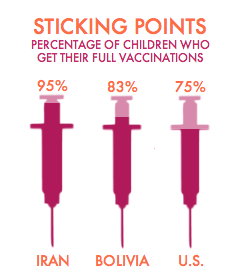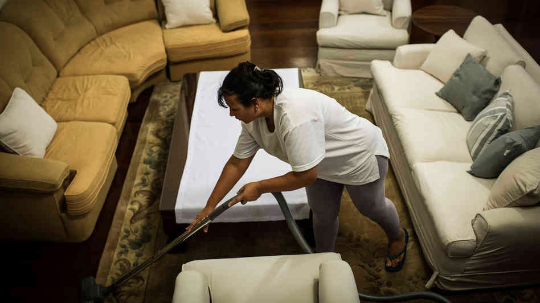
June 10, 2013 | Law and Justice, Economic Opportunity
The Rise of the Invisible Woman
We can't "lean in" without domestic workers to lean on. Now those indispensables are finally getting some recognition.

by Amanda L. Freeman
There are almost 2 million nannies, baby sitters, cleaning ladies and other domestic workers in the U.S.—but as far as the law is concerned, they might as well be invisible. Laboring behind closed doors in private homes, they are subject to whims and cruelties that no other group of employees would stand for, says Lydia Edwards, director of Legal Services for the Brazilian Immigrants Center in Boston. Her clients include a live-in nanny who was forced to sleep in a closet, and a housekeeper who was told to clean every bathroom tile with a toothpick.
But slowly, finally, things are changing, as more and more states pass domestic workers' "bills of rights," guaranteeing basic labor protections for this group. On April 30, Hawaii became the second state, after New York, to pass such a bill. Similar bills are in the pipeline in California, Oregon, Massachusetts, Texas, Ohio and Illinois.
This legislation couldn't come at a better time. The number of domestic workers, a majority of whom are single mothers themselves, has been rising over the decades—and certainly career women will have trouble heeding Sheryl Sandberg's advice to "lean in" if they can't get help managing their households. Indeed, some experts claim that a nanny strike, for instance, would effectively shut down business in a city like New York.
Groups that Help Domestic Workers
- National Domestic Workers Alliance
- Domestic Workers United
- Brazilian Immigrant Center
- International Domestic Workers' NetWork
Until working conditions change overall, though, being a domestic worker will remain a precarious position—one that is filled with the prospect of sexual harassment, low wages and a lack of clear boundaries.
One nanny, for instance, received pictures via text of her employer's penis, says Edwards; another was made to do laundry while her employer stood over her, naked. "If they treated the person taking care of their children with the same respect they gave the person fixing their toilet, that would solve a lot of issues," says Edwards, who offers mediation and legal services through a clinic for domestic workers at the Center.
The clinic's first client was a woman we'll call Lauren (her name has been changed), who has worked as a nanny for 20 years. When a family refused to pay for her last week of work because she took a sick day, Lauren sought legal help. Edwards was able to negotiate a settlement with the former employer to compensate her for that week in addition to a year and a half of overtime pay that she'd never received.
Unfair pay may be even more common than sexual harassment among domestic workers. According to the groundbreaking 2012 report, "Home Economics: The Invisible and Unregulated World of Domestic Work," a mind boggling 67 percent of live-in workers are paid less than minimum wage.
Yet, 91 percent of domestic workers don't complain about poor working conditions, because they are afraid of being fired. Making matters worse, 36 percent of domestic workers are undocumented immigrants, so they are even less likely to take legal action.
Until recently, domestic workers had little choice but to keep quiet and carry on. Housekeepers, nannies and elder caregivers have been excluded from labor laws, dating back to Reconstruction, when southern states resisted regulation of newly emancipated blacks. The Fair Labor Standards Act, which establishes minimum wage and overtime protections for most American workers, for example, does not apply to many caregivers, and live-in employees don’t qualify for overtime protections. Domestic workers are also excluded from many health and safety laws as well as protections from discrimination and harassment.
"It's almost like the wild west, because you just never know what conditions are going to be like," says Ai-jen Poo, executive director of the National Domestic Workers Alliance (NDWA). "Everyone is vulnerable because there are no standards, no guidelines to follow."
The bills cropping up in the U.S. vary by state, offering a range of protections that include paid sick days, on-duty breaks, guaranteed sleeping hours, and 30 days notice of termination.
Even the most comprehensive legislation, though, will have a hard time resolving the special nature of the nanny-family bond. Lauren found out how difficult that could be two years ago, when her employer cut her hours in half, effective immediately. She took four other part-time jobs to stay afloat and close to the child.
It is this complicated mix of work and love that makes it difficult for domestic workers to assert their rights. "We fall head over heels in love with the kids, and that is one of the things that keep us in a bad environment," says Lauren.
The fluid nature of the work also makes things tricky. Parents of young children or elderly clients often make unrealistic demands of caregivers because they see them as part of the family. When a caregiver takes a child trick-or-treating or to the playground, sometimes parents don't view this as work, according to Edwards.
Many employers are reluctant to give caregivers breaks throughout the workday, assuming they have built-in time to rest. But the demands on live-in employees can be all consuming. "You're on-call 24 hours a day," says Lauren. "Once, I had a mom just stay out all night without even a phone call. Or you get parents knocking on your door in the middle of the night, asking for cough syrup."
Because women's household work has been long undervalued, part of the mission of the NDWA is to "lift up the value and the dignity of care work, because it is the work that makes all other work possible," says Poo.
What can you do to support domestic workers? If you employ them yourself, first, consider whether you have a "just household," suggests Edwards who developed a manual that outlines fair labor practices. Sit down with a blank contract and talk to your nanny, housekeeper or home health aide about duties and salary.
"There are some really wonderful employers out there supporting their domestic workers," says Poo, "And we should hold them up as models to show people what is possible. This can be a win-win situation."
Amanda L. Freeman is a writer, researcher and doctoral candidate specializing in single-mother-headed families.